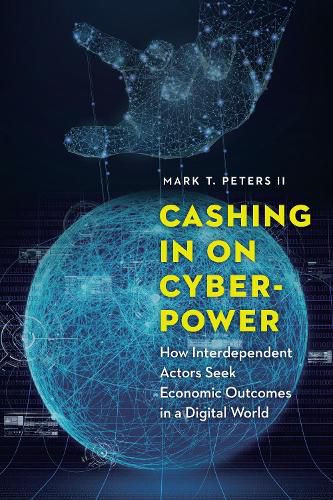Readings Newsletter
Become a Readings Member to make your shopping experience even easier.
Sign in or sign up for free!
You’re not far away from qualifying for FREE standard shipping within Australia
You’ve qualified for FREE standard shipping within Australia
The cart is loading…






Over recent centuries, nations struggling for increased power over their neighbors sought mainly symmetric advantages, using clearly defined strategies to crush enemies using military force, coercion, and domination. In recent years, however, as the world becomes increasingly digitally interconnected, military leaders are ditching such symmetric power plays in favor of cyber strategies. Emerging from an interdependent framework, asymmetric cyber strategy confuses national power interaction across the global commons through flow interruptions and the associated difficulty in attributing influences. Clearly identifying state and non-state actors who use cyber means for economic manipulation drives Mark Peter’s central question, How do state and non-state actors use cyber means to influence economic power outcomes? . Using eight hypotheses to develop this central question, Peters analyzes 198 cyber events, discussing their area of effect, targeting intent, method, and attribution. He also explores newly developed case studies depicting the 2012 trade negotiation espionage in the Japanese Trans-Pacific Partnership preparations, the 2015 cyber-attacks on Ukrainian SCADA systems, and the 2010 intellectual property theft of a gold detector design from the Australian Codan corporation. All hypotheses combine to identify new data and provide a concrete baseline depicting how leaders use cyber means to achieve their economic outcomes.
$9.00 standard shipping within Australia
FREE standard shipping within Australia for orders over $100.00
Express & International shipping calculated at checkout
Over recent centuries, nations struggling for increased power over their neighbors sought mainly symmetric advantages, using clearly defined strategies to crush enemies using military force, coercion, and domination. In recent years, however, as the world becomes increasingly digitally interconnected, military leaders are ditching such symmetric power plays in favor of cyber strategies. Emerging from an interdependent framework, asymmetric cyber strategy confuses national power interaction across the global commons through flow interruptions and the associated difficulty in attributing influences. Clearly identifying state and non-state actors who use cyber means for economic manipulation drives Mark Peter’s central question, How do state and non-state actors use cyber means to influence economic power outcomes? . Using eight hypotheses to develop this central question, Peters analyzes 198 cyber events, discussing their area of effect, targeting intent, method, and attribution. He also explores newly developed case studies depicting the 2012 trade negotiation espionage in the Japanese Trans-Pacific Partnership preparations, the 2015 cyber-attacks on Ukrainian SCADA systems, and the 2010 intellectual property theft of a gold detector design from the Australian Codan corporation. All hypotheses combine to identify new data and provide a concrete baseline depicting how leaders use cyber means to achieve their economic outcomes.